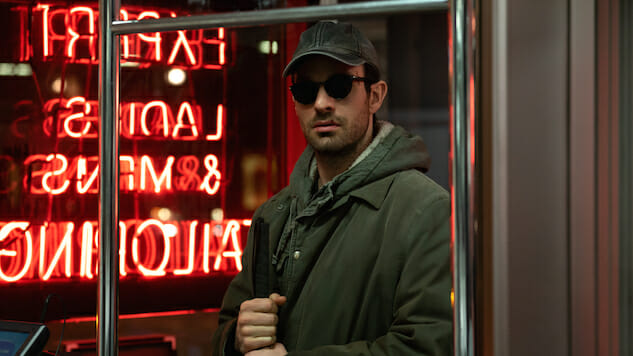The 12 Pros and Cons of Marvel’s Daredevil Season Three
Photo: Nicole Rivelli/Netflix
I don’t know what to do with Daredevil. I never have. Perhaps more than any show in the whole Marvel-Netflix Globular Cluster, Daredevil makes me question everything I like and everything I dislike about the Heroes for Hire and their simultaneously intriguing and mind-numbing transits through space-time. Marvel’s obsession with meta-humans, Enhanced Persons, mutants, demi-aliens, demi-gods and demi-demons can… get old. For every one that presents a pithy reflection of Othering and human fear, there are three that just make you wonder when we’re going to move on already, and for every genuinely clever How I Got My Superpowers origin story there’s… an Iron Fist. I don’t hate Daredevil, though sometimes I ask myself why I don’t hate it and have a hard time answering, and I also don’t love it, and I have an equally hard time saying why it doesn’t pack the punch of the first season of Jessica Jones or the second season of Luke Cage. Honestly, the cast is appealing and the premise actually strikes me as one of the better ones: Bruh: Justice Is Blind! Literally! Lawyer by day, vigilante by night! A Catholic anti-saint who defends Hell’s Actual Kitchen both within and outside the system! There’s scope here.
But, let’s be honest… Daredevil has been a mixed bag. Including the brown paper bag in which Matt Murdock (Charlie Cox) hands his super-dude mask to Karen (Deborah Ann Woll); I mean, what is that about? All the other masked heroes just unmask themselves, preferably after a battle and in a hair-rippling wind, and reveal their mask-less, my-God-it-was-you-all-along faces with a proud yet tormented expression, no? Anyway. Relentlessly grisly and strangely afraid of sensuality or romance, often bringing us villains who are more interesting than the heroes (take a bow, Vincent D’Onofrio and Jon Bernthal), and truly, truly straining the notion that our hero cannot burden one single civilian with the truth of his identity, Daredevil has had its ups and downs. The pacing has been patchy, the dialogue largely unfortunate, and a lot of metaphorical terrain remains untapped. Yet, even when it annoyed me, I was loathe to give up on it. So I hoped Season Three would be the quantum leap Luke Cage enjoyed in its second season, which took it from ham-fisted (with glimmers) to fully badass. I was hoping we were going to get deep, deep into the Catholic guilt thing and the inner demons versus outer demons thing and the trust-issues thing and… well.
Right away, you get absurd plot points (Murdock survives something you’d have to be Wolverine to get out of; enhanced senses don’t make you drown-proof) and confusing artistic choices (Murdock is blind. Why are we seeing unfocused, hazy, I’m-just-coming- out-of-a-coma image distortion? Y’all could have done so much with sound and darkness, just saying). Matt scripture-splains to a nun so the audience gets CliffsNotes on the Book of Job. (My hopes for next-level subtlety were dashed in the first 30 minutes.) On the other hand, the obligatory back story flashbacks are relatively well-handled, with Young Matt and Adult Matt reconnecting in the church where he was raised after the death of his dad; you see the beginnings of a verbal pugilist as well as a physical ass-kicker, and also get some nice, symbolically freighted scene-lets of the frightened and grieving people in the church and how that space amplifies Matt’s supernatural hearing. On the other other hand, there’s an artfully shot but irritatingly tangential foray into the childhood of a ticking-bomb FBI sniper who catches the attention of Wilson Fisk (D’Onofrio), and one begins to wonder how many characters truly require a bad-childhood origin story to justify their adult existence as characters. It feels like there are a hell of a lot of them in the MCU, and I think there is such a thing as too many. In fact, Daredevil might have located where “too many” resides. (Hell’s Kitchen!)
So, I drew up a pro/con list:
Pro: Wilson Fisk in a white suit haunting Murdock’s subconscious.
Con: Scorching case of Heavy Is the Head That Wears the Crown Syndrome.
Pro: Doppel-Däredevil?
Con: Foggy (Elden Henson) really needs a more interesting girlfriend than Marci (Amy Rutberg).
Pro: One of the best prison-breakout sequences since The Great Escape. OK, maybe that’s the Merlot talking, but honestly, it’s pretty badass.